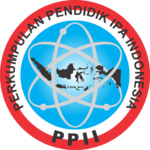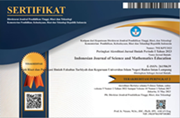Applying APOS Theory to Enhance Algebraic Logic Skills: Comparing Traditional Teaching and Computer-Assisted Instruction
Abstract
This study aims to assess how effectively applied science students use equations to express connectivity in algebraic logic and understand their cognitive framework. This research measures students' understanding of mathematical logic connectors in line with the polytechnic curriculum and uses APOS theory as a basis. It compares the effectiveness of traditional teaching methods with the computer-assisted instruction (CAI) approach. The results show that students learning with CAI perform better in applying connectivity equations. These findings underscore the importance of students' cognitive schemes in understanding the relationship between algebra and logic. Students with a more mature conceptual understanding tend to overcome conceptual application difficulties better. For future research, it is suggested to explore the application of CAI methods in various learning contexts and other disciplines, as well as to assess its long-term impact on students' cognitive skills and mathematical understanding. Additionally, it is essential to compare the effectiveness of CAI with other innovative learning methods to determine the best approach to developing students' logic and algebra skills.
Keywords
Full Text:
PDFReferences
N. Megill and D. A. Wheeler, Metamath: a computer language for mathematical proofs. North Carolina : Lulu Press, 2019.
G. Takeuti, “Gödel numbers of product spaces,” Higher Set Theory: Proceedings, Oberwolfach, Germany, vol. DCLXIX, no. 1, pp. 461–471, 2006.
E. Cheng, “The Art of Logic: How to make sense in a world that doesn’t,” EURASIA J. Math. Sci. Technol. Educ., vol. XVI, no. 6, pp. 461-471, 2020.
P. Fletcher and C. W. Patty, Foundations of higher mathematics. Boston : PWS, 1996.
E. Dubinsky, “Reflective abstraction in advanced mathematical thinking,” in Advanced mathematical thinking, vol. II, no. 1, pp. 95–126, 1991.
J. Cottrill, E. Dubinsky, D. Nichols, K. Schwingendorf, K. Thomas, and D. Vidakovic, “Understanding the limit concept: Beginning with a coordinated process scheme,” J. Math. Behav., vol. XV, no. 2, pp. 167–192, 1996.
A. Maharaj, “Students’ Understanding of Solving a System of Linear Equations Using Matrix Methods: A Case Study,” Int. J. Educ. Sci., vol. XXI, no. 3, pp. 124–134, 2018.
N. Bhatti, “CAI and conventional method for retention of mathematics: an experimental study,” in Journal of Physics: Conference Series, vol. MCLVII, no. 3, pp. 1-9, 2019.
B. K. Bayrak and H. Bayram, “The effect of computer aided teaching method on the students’ academic achievement in the science and technology course,” Procedia-Social Behav. Sci., vol. IX, no. 1, pp. 235–238, 2010.
C. W. K. Chen, C. Chen, and C.-J. Shieh, “A Study on Correlations between Computer-Aided Instructions Integrated Environmental Education and Students’ Learning Outcome and Environmental Literacy.,” EURASIA J. Math. Sci. Technol. Educ., vol. XVI, no. 6, pp. 1-7, 2020.
K. I. Handayani, D. M, and K. Kamid, “Pemahaman Siswa Berdasarkan Teori APOS Ditinjau dari Gaya Kognitif Field Dependence dan Field Independence,” J. Cendekia J. Pendidik. Mat., vol. V, no. 2, pp. 1650–1660, 2021.
S. Supratman, M. Marniati, and L. O. Sirad, “Analisis Pemahaman Konsep Mahasiswa Usn Kolaka Dalam Menyelesaikan Masalah Persamaan Differensial Berdasarkan Teori Apos,” AKSIOMA J. Progr. Stud. Pendidik. Mat., vol. XI, no. 4, pp. 3019-3030, 2022.
R. Y. Rahmawati and E. Khaerunnisa, “Analisis Kemampuan Pemahaman Konsep Matematis Analysis of Students ’ Mathematical Concept Understanding Ability Based on Apos Theory,” vol. IV, no. 1, pp. 50–57, 2022.
M. Nurajijah, E. Khaerunnisa, and C. A. Hadi FS, “Kemampuan Pemahaman Konsep Matematis Siswa Berdasarkan Teori Apos Pada Materi Program Linear,” J. Educ. FKIP UNMA, vol. IX, no. 2, pp. 785–797, 2023.
A. Maharaj, “An APOS analysis of natural science students’ understanding of derivatives,” South African J. Educ., vol. XXXIII, no. 1, pp. 1–19, 2013.
I. O. Longe and A. Maharaj, “Investigating Students’ Understanding of Complex Number and Its Relation to Algebraic Group Using and APOS Theory,” J. Medives J. Math. Educ. IKIP Veteran Semarang, vol. VII, no. 1, pp. 117–134, 2023.
E. Gallagher, R. Bones, and J. Lombe, “Precision teaching and education: Is fluency the missing link between success and failure?,” Irish Educ. Stud., vol. XXV, no. 1, pp. 93–105, 2006.
C. Xie, A. C. K. Cheung, W. W. F. Lau, and R. E. Slavin, “The effects of computer-assisted instruction on mathematics achievement in mainland China: a meta-analysis,” Int. J. Educ. Res., vol. CII, no. 1, pp. 11-19, 2020.
H. Patadia and M. P. Ramani, “Computer Assisted Instruction and Teaching of Arithmetic,” Int. J. Sci. Res. Publ., vol. I, no. 1, pp. 477-489, 2012.
K. A. Bakar, R. A. Tarmizi, R. Mahyuddin, H. Elias, W. S. Luan, and A. F. M. Ayub, “Relationships between university students’ achievement motivation, attitude and academic performance in Malaysia,” Procedia-Social Behav. Sci., vol. II, no. 2, pp. 4906–4910, 2010.
C. Yang and Y. Chang, “Assessing the effects of interactive blogging on student attitudes towards peer interaction, learning motivation, and academic achievements,” J. Comput. Assist. Learn., vol. XXVIII, no. 2, pp. 126–135, 2012.
J. S. Suan, “Factors affecting underachievement in mathematics,” Proceeding Glob. Summit Educ. GSE, vol. V, no. 1, pp. 1-7, 2014.
G. Baş, “Investigating the effects of project-based learning on students’ academic achievement and attitudes towards English lesson,” online J. New Horizons Educ., vol. I, no. 4, pp. 1-15, 2011.
R. B. McNeal Jr, “Parent Involvement, Academic Achievement and the Role of Student Attitudes and Behaviors as Mediators.,” Univers. J. Educ. Res., vol. II, no. 8, pp. 564–576, 2014.
V. Borji and M. G. Voskoglou, “Applying the APOS theory to study the student understanding of the polar coordinates,” Am. J. Educ. Res., vol. IV, no. 16, pp. 1149–1156, 2016.
Ö. Şefik, Ö. E. Uzun, and D. Şenol, “Content analysis of the apos theory studies on mathematics education conducted in turkey and internationally: a meta-synthesis study,” Necatibey Eğitim Fakültesi Elektron. Fen ve Mat. Eğitimi Derg., vol. XV, no. 2, pp. 404–428, 2021.
DOI: http://dx.doi.org/10.24042/ijsme.v6i3.16298
Refbacks
- There are currently no refbacks.
Copyright (c) 2023 Unit Riset dan Publikasi Ilmiah FTK UIN Raden Intan Lampung

This work is licensed under a Creative Commons Attribution-ShareAlike 4.0 International License.

Indonesian Journal of Science and Mathematics Education is licensed under a Creative Commons Attribution-ShareAlike 4.0 International License.




